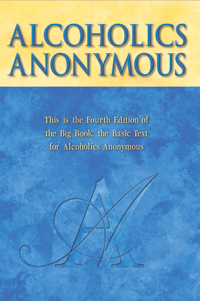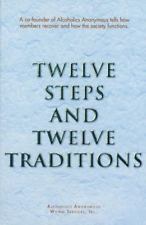Seventh Step Prayer
"When ready, we say something like this: 'My Creator,
I am now willing that you should have all of me,
good and bad. I pray that you now remove from me
every single defect of character which stands in the
way of my usefulness to you and my fellows. Grant
me strength, as I go out from here , to do your bidding.
Amen."' We have then completed Step Seven."
Page 76, Into Action
"We attempt to sweep away the debris which has accumulated
out of our effort to live on self-will and run the show ourselves. If we haven't
the will to do this, we ask until it comes."
Page 76, Into Action, Steps Eight and Nine
"Before taking drastic action which might implicate other people we secure their
consent. If we have obtained permission, have consulted with others, asked
God to help and the drastic step is indicated we must not shrink."
Page 80, Into Action, Steps Eight and Nine
"It may be that both will decide that the way of good sense and loving kindness is to
let by-gones be by-gones. Each might pray about it, having the other one's happiness
uppermost in mind."
Page 82, Into Action, Steps Eight and Nine
"Their [family members] defects may be glaring, but the chances are that
our own actions are partly responsible. So we clean house with the family, asking each
morning in meditation that our Creator show us the way of patience,
tolerance, kindliness and love."
Page 83, Into Action, Steps Eight and Nine
"Continue to watch for selfishness, dishonesty, resentment, and fear. When
these crop up, we ask God at once to remove them."
Page 84, Into Action, Step Ten
"Every day is a day when we must carry the
vision of God's will into all of our activities. 'How
can I best serve Thee--Thy will (not mine) be done.' "
Page 85, Into Action, Step Ten
"When we retire at night, we constructively review our day. Were we resentful, selfish, dishonest or afraid? ... After making our review we ask God's forgiveness and inquire what corrective measures should be taken...
"On awakening let us think about the twenty-four hours ahead. We consider our plans for the day. Before we begin, we ask God to direct our thinking, especially asking that it bedivorced from self-pity, dishonest or self-seeking motives...
"In thinking about our day we may face indecision. We may not be able to determine which course to take. Here we ask God for inspiration, an intuitive thought or a decision."
Page 86, Into Action, Step Eleven
"We usually conclude the period of meditation with
a prayer that we be shown all through the day what
our next step is to be, that we be given whatever we
need to take care of such problems. We ask especially
for freedom from self-will, and are careful to make no
request for ourselves only...
"If circumstances warrant, we ask our wives or
friends to join us in morning meditation. If we belong
to a religious denomination which requires a definite
morning devotion, we attend to that also. If not members
of religious bodies, we sometimes select and
memorize a few set prayers which emphasize the
principles we have been discussing."
Page 87, Into Action, Step Eleven
"As we go through the day we pause, when agitated
or doubtful, and ask for the right thought or action.
We constantly remind ourselves we are no longer
running the show, humbly saying to ourselves many
times each day "Thy will be done."
Page 87-8, Into Action, Step Eleven
12 & 12:
"In all times of emotional disturbance or
indecision, we can pause, ask for quiet, and in the stillness simply say: "God
grant me the serenity to accept the things I cannot change, courage to change
the things I can, and wisdom to know the difference. Thy will, not mine, be
done."
Page 41, Step Three
"It does not lighten our burden when we recklessly
make the crosses of others heavier.
"Many a razor-edged question can arise in other departments of life where this
same principle is involved. Suppose, for instance, that we have drunk up a good
chunk of our firm's money, whether by 'borrowing' or on a heavily padded
expense account. Suppose that this may continue to go undetected, if we say
nothing... Do we lay the matter before our sponsor or spiritual adviser,
earnestly asking God's help and guidance--meanwhile resolving to do the right
thing when it becomes clear, cost what it may?"
Page 86-7, Step Nine
"When in doubt we can always pause, saying, 'Not my
will, but Thine, be done.' And we can often ask ourselves, "'Am I doing to
others as I would have them do to me--today?'
Page 93, Step Ten
"Having so considered our day, not omitting to take due note of things well
done, and having searched our hearts with neither fear nor favor, we can truly
thank God for the blessings we have received and sleep in good conscience."
Page 95, Step Ten
" 'Lord, make me a channel of thy peace--that where there is hatred, I may bring
love--that where there is wrong, I may bring the spirit of forgiveness--that
where there is discord, I may bring harmony--that where there is error, I may
bring truth--that where there is doubt, I may bring faith--that where there is
despair, I may bring hope--that where there are shadows, I may bring
light--that where there is sadness, I may bring joy. Lord, grant that I may
seek rather to comfort than to be comforted--to understand, than to be
understood--to love, than to be loved. For it is by self-forgetting that one
finds. It is by forgiving that one is forgiven. It is by dying that one awakens
to Eternal Life. Amen.' "
Page 99, Step Eleven, St Francis Prayer (aka Eleventh Step Prayer)
"In the morning we think of the hours to come. Perhaps we think of our day's
work and the chances it may afford us to be useful and helpful, or of some
special problem that it may bring. Possibly today will see a continuation of a
serious and as yet unresolved problem left over from yesterday. Our immediate
temptation will be to ask for specific solutions to specific problems, and for
the ability to help other people as we have already thought they should be
helped. In that case, we are asking God to do it our way. Therefore, we
ought to consider each request carefully to see what its real merit is. Even
so, when making specific requests, it will be well to add to each one of them
this qualification: "...if it be Thy will." We ask simply that throughout the
day God place in us the best understanding of His will that we can have for
that day, and that we be given the grace by which we may carry it out.
"As the day goes on, we can pause where situations must be met and decisions
made, and renew the simple request: "Thy will, not mine, be done." If at these
points our emotional disturbance happens to be great, we will more surely keep
our balance, provided we remember, and repeat to ourselves, a particular prayer
or phrase that has appealed to us in our reading or meditation."
Page 102-3, Step Eleven
"It is A.A.'s experience that particularly in these cases [when people are in need] we ought to pray that God's will, whatever it is, be done for others as well as for ourselves."
Page 104, Step Eleven

